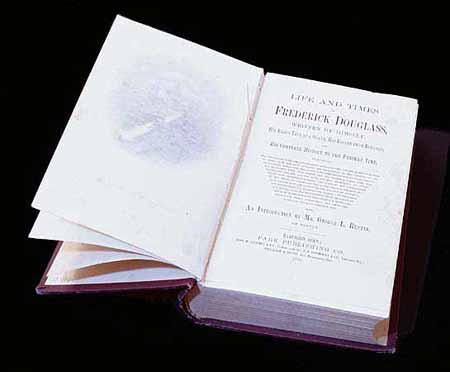Heroic Exile: Bibliography
![]() Primary Sources
Primary Sources
Manuscript Collections and Archives
-
Frederick Douglass Papers—West Virginia University
Frederick Douglass Papers, General Correspondence—Library of Congress (on microfilm)
Weston Sisters Papers; American Anti-Slavery Society Papers—Boston Public Library
Richard Davis Webb autographs—Trinity College (Dublin) Library
Newspaper Collection, General Collection—British Library
Anti-Slavery Collection—Rhodes House Library, Oxford University (on microfilm)Newspapers
Cork Examiner
Dundee Courier
Dublin Freeman’s Journal
The LiberatorLetters, Correspondence, and Selected Writings
Blassingame, John (et al eds.). The Frederick Douglass Papers: Series One—Speeches, Debates, and Interviews. New Haven: Yale University Press, 1979.
- Volume I 1841-1846.
Volume II 1847-1854.
“Correspondence between the Rev. Samuel Cox, D.D. of Brooklyn L.I and Frederick Douglass, a fugitive slave.” New York: Office of the American Anti-Slavery Society, 1846.
Douglass, Frederick. Narrative of the Life of Frederick Douglass, an American Slave (1845). New York: Signet, 1968.
———. “The Heroic Slave” in Takaki, Ronald (ed.). Violence in the Black Imagination: Essays and Documents. New York: G.P. Putnam’s Sons, 1972.
———. “Letter to his Old Master.” In Frederick Douglass, My Bondage and My Freedom, Ebony Classics, Chicago: Johnson Publishing Company, 1970.
———. My Bondage and My Freedom (1855). Ebony Classics, Chicago: Johnson Publishing Company, 1970.
Foner, Philip (ed). Life and Writings of Frederick Douglass. New York: International Publishers, 1950.- Vol 1: Early Years, 1817-1849.
Vol 5: Supplementary Volume, 1844-1860.
Merrill, Walter (ed.). The Letters of William Lloyd Garrison. Vol. III: No Union With Slave-Holders 1841-1846.Cambridge, Mass.: The Belknap Press, 1973.
Taylor, Clare (ed.). British and American Abolitionists: an Episode in Transatlantic Understanding Edinburgh. Edinburgh: Edinburgh University Press, 1974. - Volume I 1841-1846.
Secondary Sources
- Blackett, R.J.M. Building an Anti-Slavery Wall: Black Americans in the Atlantic Abolitionist Movement, 1830-1860. Baton Rouge: Louisiana State University Press, 1983.
Blight, David. Frederick Douglass’s Civil War. Baton Rouge: Louisiana State University Press, 1989.
Castronovo, Russ. “As to Nation, I Belong to None.” American Transcendental Quarterly 9:3 (September 1995): 245-260.
Cheesebrough, David. Frederick Douglass: Oratory from Slavery. Westport, Conn.: Greenwood Press, 1998.
De Pietro, Thomas. “Vision and Revision in the Autobiographies of Frederick Douglass.” CLA
Journal 26 (June 1983): 384-396.
Foner, Philip. Frederick Douglass: A Biography. New York: Citadel Press, 1964.
Fredrickson, George. The Black Image in the White Mind: The Debate on Afro-American Character and Destiny, 1817-1914. New York: Harper and Row, 1971.
Friedman, Lawrence. Gregarious Saints: Self and Community in American Abolition 1830-1870. New York: Cambridge University Press, 1982.
Fulkerson, Gerald. “Exile as Emergence: Frederick Douglass in Great Britain, 1845-1847.” The Quarterly Journal of Speech 60 (February 1974): 69-82.
Garvey, Gregory. “Frederick Douglass’s Change of Opinion on the U.S. Constitution: Abolitionism and ‘Elements of Moral Power.” American Transcendental Quarterly 9:3 (September 1995): 229-243.
Gates, Henry Lewis. Figures in Black: Words, Signs, and the “Racial” Self. New York: Oxford University Press, 1987.
———. “A Dangerous Literacy: The Legacy of Frederick Douglass,” New York Times Book Review. May 28, 1995: 3-4.
Gilroy Paul. The Black Atlantic: Modernity and Double Consciousness. Cambridge, Mass: Harvard University Press, 1993.
Kraditor, Aileen. Means and Ends in American Abolitionism: Garrison and his critics on Strategy and Tactics 1834-1850. New York: Pantheon Books, 1969.
Levine, Robert. Martin Delany, Frederick Douglass and the Politics of Representative Identity. Chapel Hill, N.C.: University of North Carolina Press, 1997.
Litwack, Leon, “The Emancipation of the Negro Abolitionist,” in Martin Duberman (ed.), The Antislavery Vanguard: New Essays on the Abolitionists. Princeton: Princeton University Press, 1965.
Lorimer, Douglas. Color, Class and the Victorians: English Attitudes to the Negro in the mid-nineteenth century. Leicester: Leicester University Press, 1978.
Martin, Waldo. The Mind of Frederick Douglass. Chapel Hill, N.C.: University of North Carolina Press, 1984.
McFeely, William. Frederick Douglass. New York: W.W. Norton & Co., 1991.
Merrill, Walter. Against the Wind: A Biography of Wm. Lloyd Garrison. Cambridge, Mass: Harvard University Press, 1963.
Pease, William and Jane. “Antislavery Ambivalence: Immediatism, Expediency, Race.” American Quarterly17:4 (Winter 1965): 682-695.
Pease, Jane and William, “Ends, Means, and Attitudes: Black-White Conflict in the Antislavery Movement.”Civil War History 18:2 (June 1972): 117-128.
———. They Who Would Be Free: Black’s Search for Freedom 1830-1861. New York: Atheneum Press, 1974.
Pettinger, Alasdair, “ ‘Send Back the Money’: Douglass and the Free Church of Scotland,” unpublished manuscript, Special Collections, Frederick Douglass Papers, West Virginia University.
Pickett, T.H. “The Friendship of Frederick Douglass with the German, Ottilie Assing.” The Georgia Historical Quarterly 73:1 (Spring 1989): 88-105.
Preston, Dickson. Young Frederick Douglass: The Maryland Years. Baltimore: Johns Hopkins University Press, 1980.
Quarles, Benjamin. Black Abolitionists. New York: Oxford University Press, 1969.
———Frederick Douglass. New York: Atheneum, 1948 (reprint, 1968).
Riach, Douglas. “Richard Davis Webb and Antislavery in Ireland,” in ed. Perry, Lewis and Fellman, Michael.Anti-Slavery Reconsidered: New Perspectives on the Abolitionists Baton Rouge: Louisiana State University Press, 1979.
Rice, Alan J., and Martin Crawford, eds. Liberating Sojourn: Frederick Douglass and Transatlantic Reform. Athens: University of Georgia Press, 1999.
Rice, C. Duncan. The Scots Abolitionists 1833-1861. Baton Rouge: Louisiana State University Press, 1981.
Shepperson, George. “The Free Church and American Slavery.” Scottish Historical Review 30 (October 1951): 126-143.
———. “Frederick Douglass and Scotland.” Journal of Negro History 38 (July 1953): 307-321.
Smith, Stephanie. “Heart Attacks: Frederick Douglass’s Strategic Sentimentality.” Criticism 34:2 (Spring 1992): 193-216.
Sprague, Rosetta Douglass. “Anna Murray-Douglass—My Mother as I Recall Her.” Journal of Negro History 8 (January 1923): 93-101.
Stepto, Robert. “Storytelling in Early Afro-American Fiction: Frederick Douglass’ ‘The Heroic Slave.’” Georgia Review 36 (Summer 1982): 355-368.
Sundquist, Eric (ed.). Frederick Douglass: New Literary and Historical Essays. New York: Cambridge University Press, 1990.
Temperley, Howard. British Anti-Slavery 1833-1970. Columbia: University of South Carolina Press, 1972.
Tillery, Tyrone. “The Inevitability of the Douglass-Garrison Conflict.” Phylon 37:2 (June 1976): 137-149.
Walker, Peter. Moral Choice: Memory, Desire, and Imagination in Nineteenth Century American Abolition. Baton Rouge: Louisiana State University Press, 1978.
Walters, Ronald. The Antislavery Appeal: American Abolitionism after 1830. Baltimore: Johns Hopkins University Press, 1976.
 Primary Sources
Primary Sources